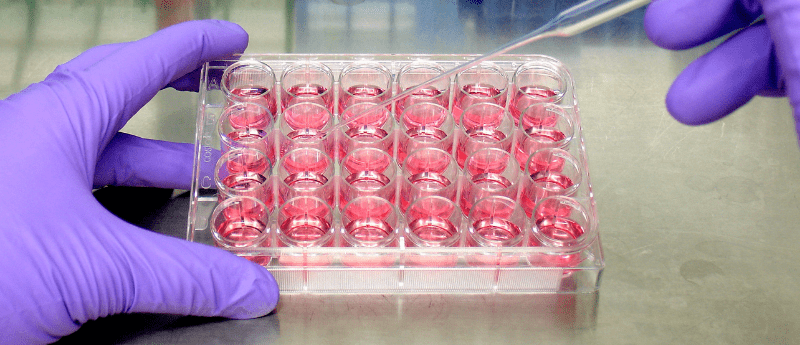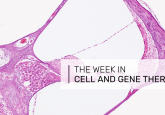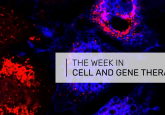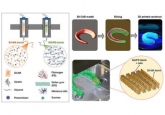Top 5 grants in regenerative medicine: November 2021

This month’s top grants in regenerative medicine, sourced from Dimensions, includes projects on: creating continuous end-to-end manufacture of cell therapies enabled by robotics and microfluidic processing, researching the role of vessel-resident progenitor cells in vascular disease, the role of myocardin-related transcription factor (MRTF) in polycystic kidney disease, induction of transplantable angiosomes for segmental bone defect regeneration, and creating immunomodulatory gene therapy strategies for post-traumatic and metabolic forms of osteoarthritis.
Check out this month’s top grants in regenerative medicine:
- Creating continuous end-to-end manufacture of cell therapies enabled by robotics and microfluidic processing
- Researching the role of vessel-resident progenitor cells in vascular disease
- The role of myocardin-related transcription factor (MRTF) in polycystic kidney disease
- Induction of transplantable angiosomes for segmental bone defect regeneration
- Creating immunomodulatory gene therapy strategies for post-traumatic and metabolic forms of osteoarthritis
Creating continuous end-to-end manufacture of cell therapies enabled by robotics and microfluidic processing
The overall goal of this project is to create a more integrated workflow for cell therapy manufacturing based on microfluidic technology and robotic cell processing. The project will initiate a transition to a more continuous cell therapy manufacturing workflow from the current batch processing to include a higher purity and yield of potent cells. This transition will have the potential to benefit other conventional manufacturing workstreams such as chemical manufacturing. The team of researchers believe that innovating new integrated processes and technologies for cell therapy products is crucial to expand access and boost the rate of innovation.
This project will aim to boost fluid dynamics at the microscale using integrated microfluidic transfection and separate operations. It will also improve regenerative strategies through improved integration of iPSC genetic engineering, robotics-based culture, and new label-free cell selection methods to purify desired cell types that adhere to manufacturing practices production.
Funding amount: US$500,000
Funding period: 15 November – 31 October 2023
Funder: Directorate for Biological Sciences (NSF BIO)
Research organization: Georgia Institute of Technology (USA)
Researching the role of vessel-resident progenitor cells in vascular disease
The aim of the study is to look at how risk factors such as hypertension lead to changes in the blood vessel structure and can damage vital organs. Researchers of this project will use stem cells from the skin to show that stem cells of patients with high blood pressure produce vascular smooth muscle cells that did not function or repair as well as healthy individuals. Split into separate groups, the team of researchers will carry out a number of experiments to test how much vessel remodeling after high blood pressure comes from the stem cells of a protein known as Sca1, tracking where the cells are going, what cells they produce, and what genes are changed after experimental high blood pressure.
The overall aim of the study will be to help understand what happens to stem cells and blood vessels after high blood pressure, and what genes cause high blood pressure-related vessel disease.
Funding amount: USD$72,000
Funding period: 1 October 2021 – 30 September 2026
Funder: Canadian Institutes of Health Research (CIHR)
Research organization: Toronto General Hospital (Canada)
The role of myocardin-related transcription factor (MRTF) in polycystic kidney disease
This project will focus on treatment research for polycystic kidney disease (PKD), a condition that affects 1 in every 500 people. The majority of PKD cases are caused by mutation or loss of one of two proteins: polycystin 1 or 2. Besides cyst formation, the other feature of PKD is progressive organ scarring or fibrosis. As this poses a key problem because fibrosis disrupts the normal tissue architecture and leads to end-stage renal disease, the research team aims to understand how PKD leads to fibrosis and also to find a cure for the disease.
The study will help lead to new therapeutic approaches to treat this common and incurable kidney disease.
Funding amount: US$66,000
Funding period: 1 October 2021 – 30 September 2026
Funder: Canadian Institutes of Health Research (CIHR)
Research organization: St. Michael’s Hospital (Canada)
Induction of transplantable angiosomes for segmental bone defect regeneration
Attempts to regrow blood vessels or functional vascularized tissue segments to negate the need for graft harvest have been based on the premise that recapitulating normal anatomy will provide a functional analogue. While there have been some demonstrations of potential, the central issue preventing an improvement in options for patients is the inability to regenerate complete vascular systems called angiosomes.
The research will challenge the idea that new growing tissues require an arterial blood supply and consider the intact venous system as a potential regenerative source.
This proposal will explore the regenerative potential of blood vessels to grow bone and develop mature new angiosomes. It will also look at developing minimally invasive approaches, reproducibility and acceleration of the process demonstrated by the research, as well as determine practical limits of the approach.
Funding amount: US$57,000
Funding period: 1 October 2021- 30 September 2026
Funder: Canadian Institutes of Health Research (CIHR)
Research organization: McGill University Health Centre (Canada)
Creating immunomodulatory gene therapy strategies for post-traumatic and metabolic forms of osteoarthritis
The main focus of this proposal will be to explore the therapies available that can slow or reverse disease progression. Previous studies have shown that gene therapy vector expressing the anti-inflammatory molecule, IL-1 receptor antagonist (IL-1Ra) can slow disease progression in small and large animal models of injury-induced osteoarthritis. The project will aim to investigate whether blocking multiple inflammatory factors simultaneously during active inflammation can slow osteoarthritis progression in injury-induced diseases. The researchers will also look into the inflammation-responsive switches to activate the delivery of regenerative factors to promote tissue repair in injuries.
Funding amount: US$58,000
Funding period: 1 October 2021- 30 September 2026
Funder: Canadian Institutes of Health Research (CIHR)
Research organization: Western University (Canada)
Brought to you with support from:






